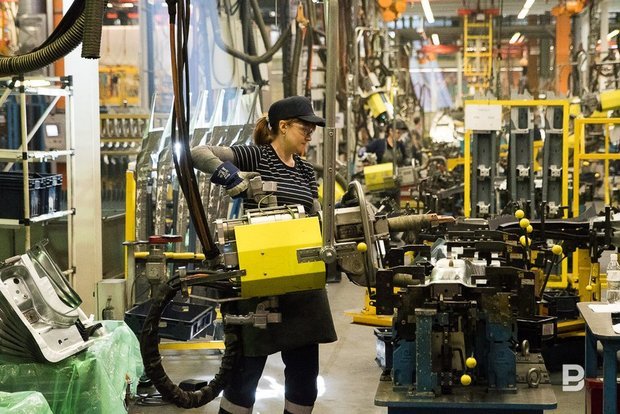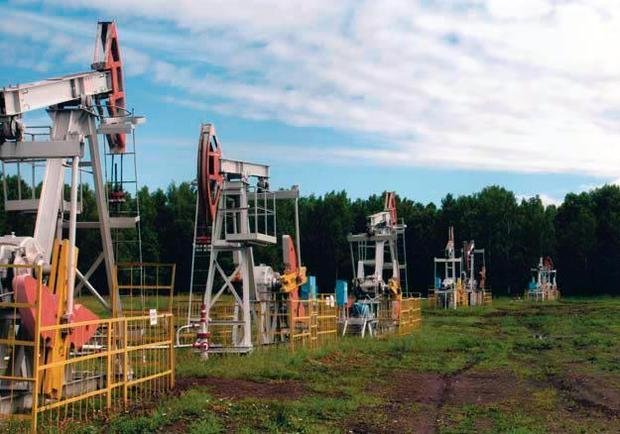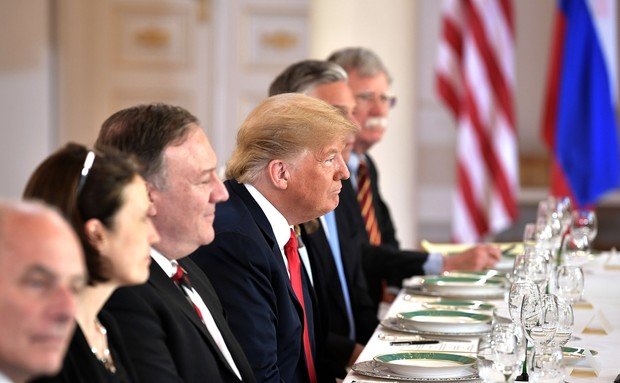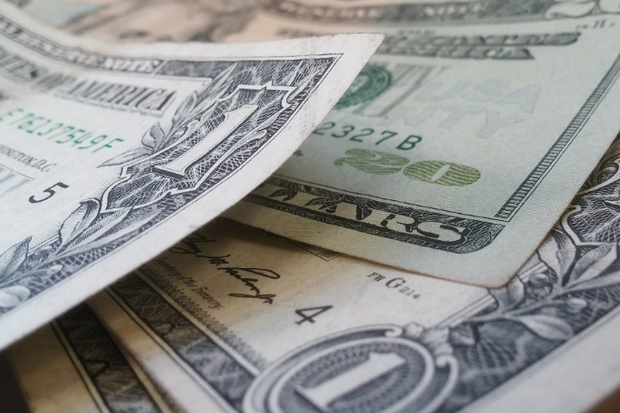''We’re dealing with the solidarity of the West. And the Skripal case added kerosene to the fire''
Political expert Aleksey Arbatov about what relations Russia will have with the West in the ''post-Salisbury'' era
Political expert, specialist in international relations and Russian foreign policy Aleksey Arbatov supposes that high oil prices won't be able to save the Russian economy any more, while the transition to the high-tech model is blocked by western sanctions. In an interview with Realnoe Vremya, the political expert also tells how probably Trump's impeachment is, whether Russia can refuse dollar and if a social protest in our country is predictable.
''A break in financial relations with the West can be equal to an economic blockade''
Mr Arbatov, the USA announced the next sanctions would be imposed against Russia in the short run. Do you agree with the opinion expressed in the Russian Embassy in the USA that they will be ''draconian''?
It depends on what exactly will be imposed. But, indeed, it can be very serious sanctions, for instance, a break in financial relations can be equal to an economic blockade. In case if our country is cut off the SWIFT financial system, it will break all transactions made in Russia and do harm to its budget and the financial system in external trade.
It's been more often mentioned in the media that there might be sanctions against flights operated by Aeroflot and prohibition of import of commodities from the USA.
This is also possible, and this will also land a heavy blow on Aeroflot. Especially if these sanctions are imposed on the planes, which the airline lease,s whose majority are US Boeings, while they need both maintenance and supply of spare parts from the USA. These sanctions will simply hew Aeroflot because it's a leading Russian company that has achieved first places in the world air service now. The same thing happens to commodities from the USA. Of course, we have a small commodity turnover with the USA. But some commodities are very important to our country, and it will be tough without them.
Do you see any understandable, final goal of the US sanctions?
It's ambiguous because there are different circles behind these sanctions in the USA. One part of the US establishment, which promotes these sanctions, really wants to destroy the Russian economy, disrupt the pillars of the Russian state and its political system. The other part, which is also quite big, supposes the disruption of pillars of the Russian state is a too dangerous course because it's impossible to predict what will happen after this goal is achieved. It's also impossible to forecast what will replace the current political system of Russia if it collapses together with the economy, that's why it's very dangerous.
For this reason, the second part of the US establishment considers sanctions as a tool to influence the current foreign policy of Russian power, which, in its opinion, must change. This refers to Ukraine, Syria and other regions of the world where Russia is acting quite actively today, augmenting its political influence and military presence.

''There is hidden unemployment in Russia, while people who remained in their workplace receive very little – especially outside Moscow and big cities. The country has tiny pensions, even if we're talking about 15,000 rubles that will turn into 21,000 after the pension reform. Our economy is in a bad state.'' Photo: Maksim Platonov
''No new oil prices will save us''
Economists say the sanctions haven't had the effect, and low oil prices do greater harm to Russia. Do you agree?
From a perspective of results reflected in the changing foreign policy of Russia, the effect hasn't been achieved. This is why more severe sanctions are imposed one by one. But from a perspective of influence on the economy, the effect is very big and very heavy.
How does it look?
Our economy isn't almost growing now, especially if we compare its growth paces with the economies of western countries and China or India. Some economists suppose we have an economic decline. We see ourselves how prices are growing fast in the country – utility bills, petrol, and it doesn't mean it's inflation. There is hidden unemployment in Russia, while people who remained in their workplace receive very little – especially outside Moscow and big cities. The country has tiny pensions, even if we're talking about 15,000 rubles that will turn into 21,000 after the pension reform. Our economy is in a bad state.
As for the claims that oil prices are the most important thing for our economy and the rest doesn't matter, it's said by people who don't understand the basics of economic theory and economic practice. Yes, we have a commodity economy, and Russian is very dependent on oil prices. But Saudi Arabia also depends on it as well as the Arab Emirates. But it's small countries, this is why they can maintain a high living standard in their countries. Russia has a huge territory, we have huge armed forces, we have huge plans in space and improvement of the population's life. Such a country can't depend on oil expert. The stagnation we've been observing since 2013 indicates to us the limits of possibilities of the commodity economy to provide the country with high development. And no new oil prices will save us, only a new high-tech, innovative model of the economy will save us. But it's hard to do with financial and technological sanctions, while it will be much harder in the future, maybe impossible.
Do we want our economy to develop according to a high-tech model? We do. Do we need foreign investment? We do. But if our both finances and technologies are restricted, fears and expectations grow, prices grow, the dollar grows. It would happen in any country, growth would stop in same China if it were imposed sanctions. And even in the USA and in any western European country.
Why is the USA ready to impose sanctions because of the Skripal case because this story didn't happen there?
We're dealing with the solidarity of the western world. And the Skripal case is a very serious reason. The West is sure it was staged by Russia: it's like adding kerosene to the fire and immediately see a serious explosion. As the West is very hostile to the current political system of Russia, its power and foreign policy, it's also an additional reason for the USA to augment and escalate this campaign.

''Such a country can't depend on oil expert. The stagnation we've been observing since 2013 indicates to us the limits of possibilities of the commodity economy to provide the country with high development. And no new oil prices will save us, only a new high-tech, innovative model of the economy will save us.'' Photo: tatneft.ru
Relations with Germany are important for Russia, as well as relations with France to a certain degree. How important are good relations with Great Britain for Russia now? Is Britain interested in Russia except the Skripal case?
Of course, Great Britain could quite do without us. From a perspective of the economy, military and political cooperation, these relations with Great Britain aren't so important. But it's not the problem. Great Britain is a leading country in the western world. Yes, now it's almost completely left the European Union. But it's one of the leading NATO members and one of the key countries in the European civilisation. And we can't isolate and cut relations with it maintaining relations with other countries. This is why relations with Great Britain aren't so precious. But considering the solidarity of the western world, worse relations with this country worsen our relations with the other countries of the West to a certain degree.
''Trump would sincerely like to improve relations with Russia. But as an absolutely ignorant he doesn't know how to do it''
Let's go back to the USA and its president. What a role does he play when making decisions on sanctions? It's unclear sometimes if he is ''for'' or ''against'' sanctions.
Trump personally doesn't want to impose sanctions. And I think he would sincerely like to improve relations with Russia. But another case is that he doesn't know how to do it because he is an inexperienced person and, dare I say it, absolutely ignorant. Trump entered the White House with good intentions, he had a desire to improve Russian-American relations too. But as soon as it comes to specific talks on certain issues, as soon as general words must be put aside and it's time to deal with the matter of our relations, the American president is immediately out of his depth. He's out of his depth and tries to count on his advisers, tries to consider the position of the Congress (without which a US president can do little, at least just because the Congress has all the money), tries to count on the press. So Trump's good intentions are a very pleasant thing for us. But it's an insufficient condition to get our relations out of the crisis and navigate in a constructive direction.
The Trump factor for Russia is a very unpredictable factor. Coming to power, he started to change all basic principles of the US politics of the last 70 years when the USA declared itself a leader of the free world in 1945, pressed all partners and allies towards itself, began to launch bases and forces and ''pursue'' democracy, started to take part in many wars. Trump said like they should stop caring for others because the others are strong enough, became economically successful and all their allies are dependents. And if they don't want to care about their own security, might they go away. And they should care about their own economy and security more.
At the same time, Trumps challenges the whole international system – the UN, WTO, declares ''trade wars'', starts to block links with some European countries (who want to buy Russian gas instead of American). All the changes Trumps is making to the US foreign policy are fundamental changes. On the one hand, they simplify Russia's situation but complicate a bit too.
And additionally, Trump's own political fate is far from being predestined. Many people think, and I'm also of the opinion that we can't exclude Trump's impeachment or such pressure on him with the threat of impeachment, which will make him resign voluntarily giving way to the vice-president like Richard Nixon did in 1974.

''Trump entered the White House with good intentions, he had a desire to improve Russian-American relations too. But as soon as it comes to specific talks on certain issues, as soon as general words must be put aside and deal with the matter of our relations, the American president is immediately out of his depth.'' Photo: kremlin.ru
Is the impeachment highly likely?
November mid-term elections to the Congress will play a big role here. If Democrats get the majority in the lower house of the Congress, they will seriously come after Trump. The lower house can make a decision without the Senate, it can raise the issue of impeachment but it can launch such investigative actions, such measures against the president that he will be cornered and have to go. The case if that the personality of Trump is unacceptable for many Americans – many people don't like the way he behaves, what statements he makes, how he changes his position. And they feel ashamed for such a president both inside the country and in front of the whole world. The Americans didn't get used to it, they think the USA must be respected, and the US president must be admired, not laughed at and made fun of every day. And, as I said, the fact that Trump decided to dramatically change the US politics causes a huge negative reaction.
But the US economy grows well under Trump, many people praise him for reducing taxes, which replenished the country's budget.
Yes, the US economy is growing now. And such a thing happened in history when, for instance, George Bush Jr came to power in 2001, the economy was also growing well, but then fell and led to the world financial crisis. It's quite probable that a similar thing can happen to the USA under Trump. Trump's tax changes and lifting restrictions on regulation of the financial system can end for the USA with what was in the end in 2008.
What's more, mainly eager beavers voted for Trump in 2016 – people who live in depressive districts of the USA, where enterprises close, and factories turn into the ''third world'', and Trump's ruling wouldn't almost help them! Trump's novelties play into hands of big corporations, the Wall Street, financial giants, modern factories – they are growing now. But those who voted for him and thought he would restore old factories will have to disappoint very soon.
''We can't know what processes take place in people's minds across the country. Look at the explosion the pension reform has caused''
It seems that sanctions against Russia will be imposed faster than Trump's impeachment begins. How long do you think Russia will be able to withstand this economic blockade from the West?
It can withstand for long. But we can't know what processes take place in people's minds across the country. Look at the explosion the pension reform has caused – it seems the president gave a speech, it seems he explained everything in a clear way, he said it wouldn't so painful. But the discontent is emerging across the country. Social processes are unpredictable! Who could imagine in 1989 that the Soviet Union would disappear two years later? Yes, the country also had economic problems – empty shelves in shops, ''sausage trains'' when people went to the capital to buy food, ruble devaluation. But nobody imagined the great country and the great empire would collapse! This is why I can't say for sure how long Russia can withstand the sanctions. As I said, it can withstand for long, but maybe not for long.

''The circulation of the dollar is prohibited in our country anyway. You can exchange your currency for dollars or vice versa, sell dollars. But you can't pay with them. If restrictions on purchase and sale of dollars are introduced, this will cause huge growth in the black market, that's to say, speculations and machinations.'' Photo: pxhere.com
Can the pension reform be a result of our confrontation with the West and the economy that worsen for this reason? Or is it just a result of our economic model?
Of course, mainly it's the result of our export-and-commodity-based economic model. The production sphere falls behind in Russia from a technological perspective, small and medium enterprises are melting in front of our eyes (despite all good words and supporting project), and it provides the highest employment in all developed countries. The inability to change this model quickly is the guilt of those who deal with our economy and politics – economy and politics are always closely connected! But relations with the West also partly influence the economy and pension affairs because the outflow of capitals brings to the closure of enterprises and companies, does harm to the financial system and our external trade. This all, of course, affects the economic growth and the incomes that go to the state's budget. If they decrease, it means the state has to economise on something, and as much as the government would like to isolate pensions, pensions can't be isolated. Money is anyway taken from one place, and it's necessary to distribute – to strengthen the defence, domestic security, construction of big bridges, the military operation in Syria, help to other countries, LPR, DPR, Abkhazia, South Ossetia. This is why this affects pensions.
VTB director Andrey Kostin has recently said about the probable refusal of Russia from the dollar. Is it real? In same settlements with importers and many other operations.
The circulation of the dollar is prohibited in our country anyway. You can exchange your currency for dollars or vice versa, sell dollars. But you can't pay with them. If restrictions on purchase and sale of dollars are introduced, this will cause huge growth in the black market, that's to say, speculations and machinations. Speaking about the prohibition of the dollar in our external trade, this is impossible because everything we buy abroad (except some countries like China or our EAEU partners) won't be sold in rubles. Moreover, the ruble's rate is very unstable. It's very doubtful that our important partner like Europe will accept rubles, so at the moment we can't refuse the dollar as a currency.
Why did Russia begin to purchase lots of gold like it had bought dollars previously?
A new wave of sanctions can suddenly limit the possibility to carry out dollar transactions. This is why we're switching to gold as a value that can't be limited or devaluate.
Can Putin finally stop waves of sanctions that anyway worsen the position of our economy? Or is a joint work of both presidents important here?
Much turns on Putin, yes. Our relations depend on Trump much less, considering the specifics of the US political system, how the opposition limits the US president, how ignorant Trump is in international affairs. Unlike Trump, Putin remains at the wheel of our foreign policy. Nobody influences him inside the country. And the solution of key problems depends on his position, his position remains decisive. For instance, Putin can anyway agree to introduce UN peacemakers to the line of separation of the opponents in Donbass. But it's hard to predict what decisions he will make in the nearest 2-3 years.